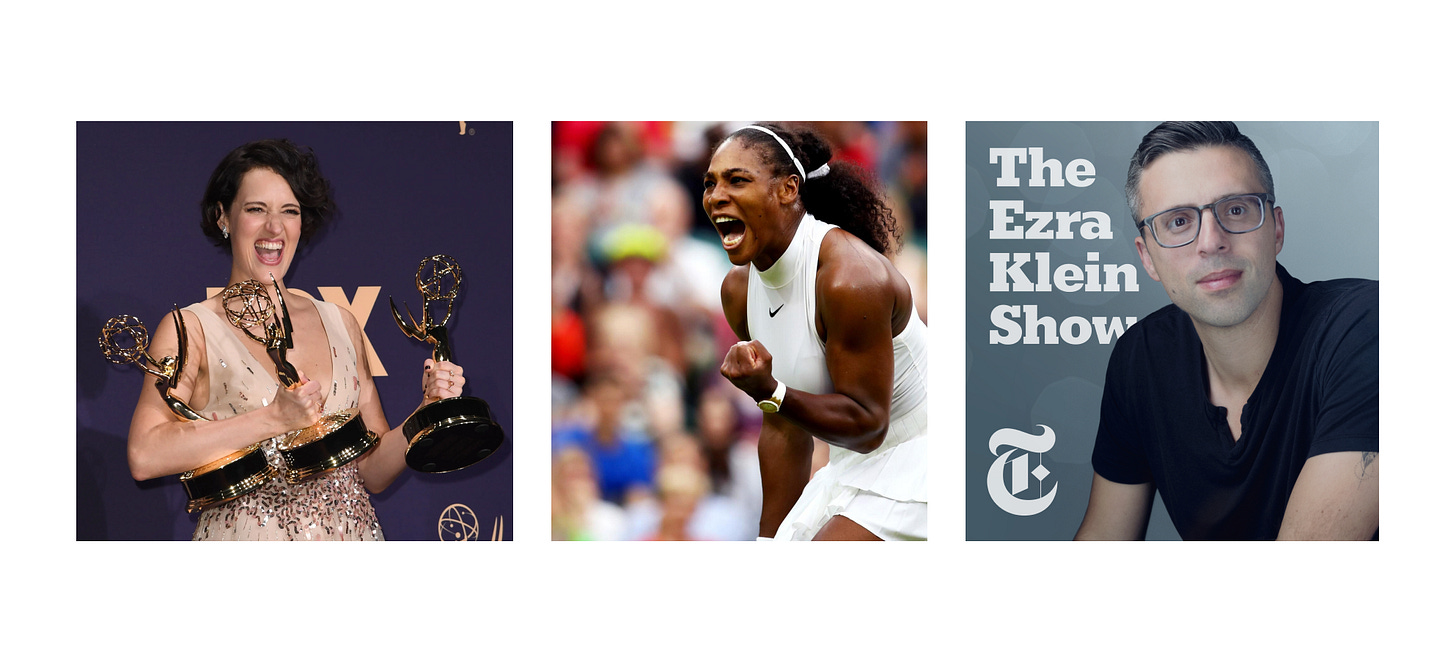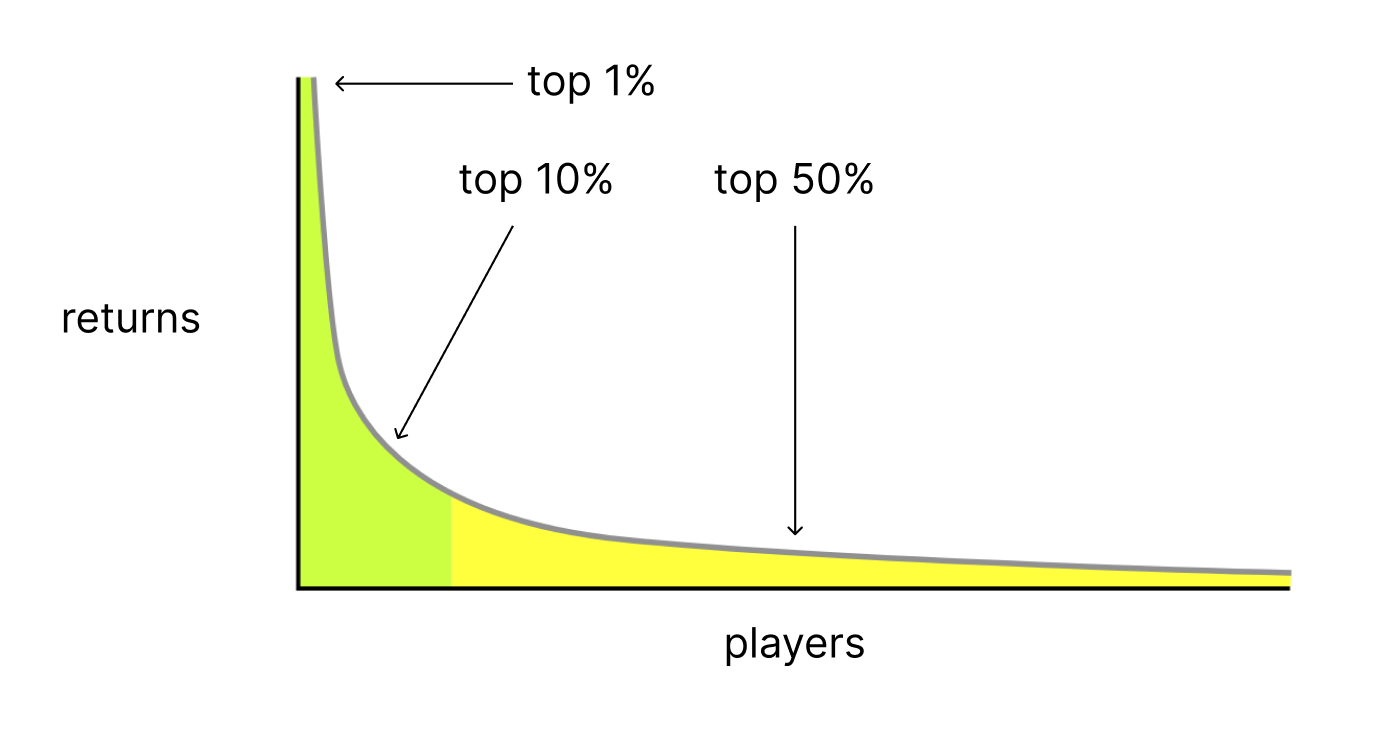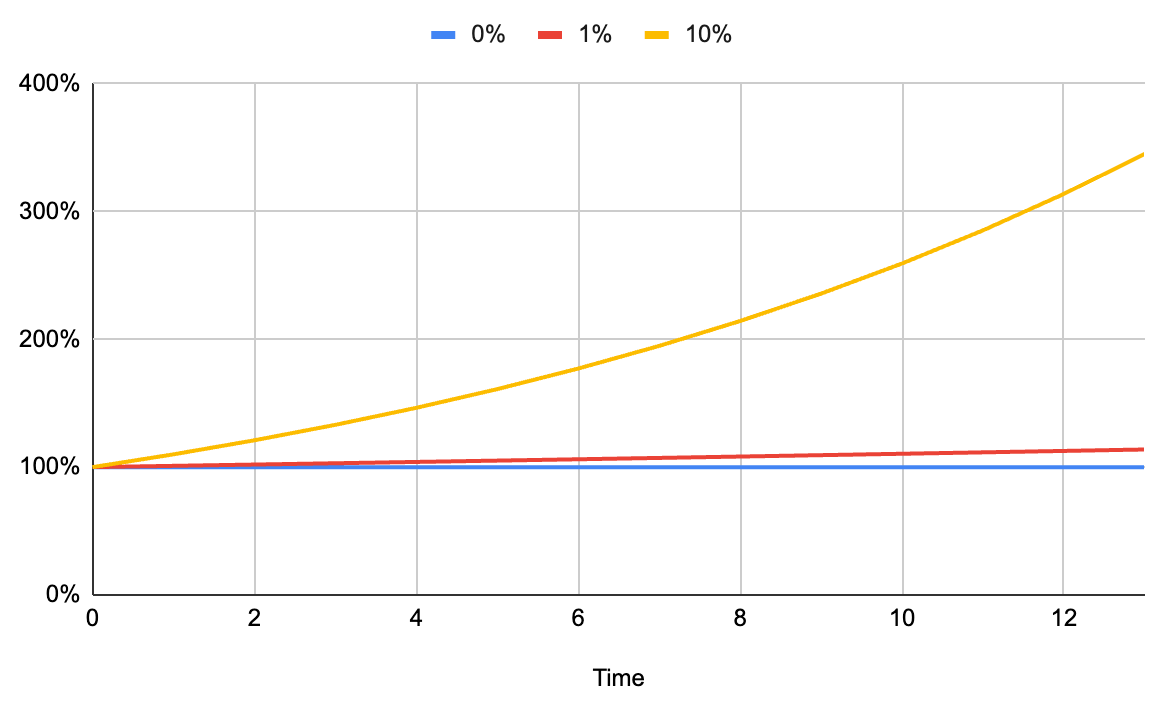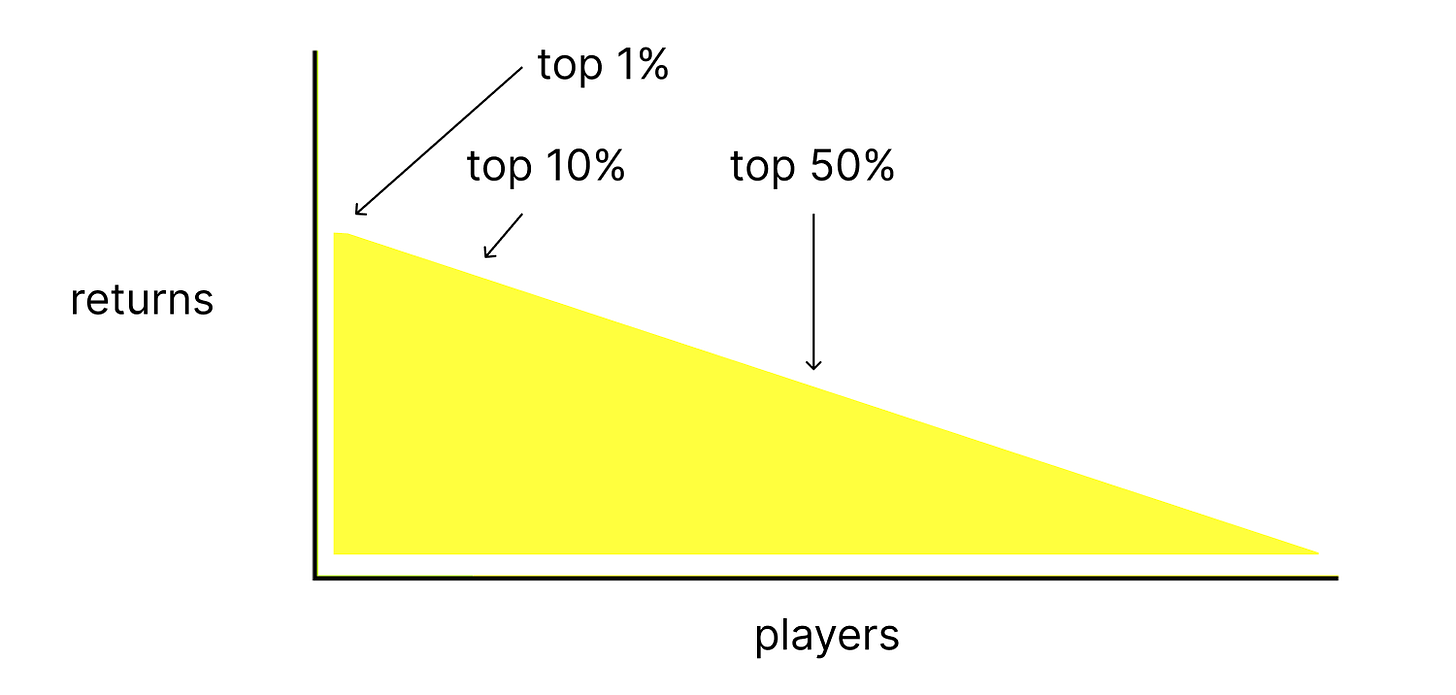🥇Career Strategy #3: Excellence in a Power Law Field
A.k.a. what movie stars, professional athletes and top journalists have in common.
Welcome back to Fuzzy’s Career Strategy Series, where we share research-backed strategies to help you realise your best career.
Part 1: 👋 Introducing the Career Strategy Series
Part 2: 🪜 Ladder Climbing as a Strategy
Part 3: 👩🎓 Controlled Supply as a Strategy
Part 5: 🔍 Niche-ing as a Strategy
Part 6: 🧱 Skill-stacking as a Strategy
Part 7: 👷 Be A Generalist as a Strategy
Part 8: 📊 The Portfolio Career as a Strategy
Part 9: 📣 Building a Platform as a Strategy
Part 10: 🌊 Wave-surfing as a Strategy
Part 11: 🏗️ Adding Leverage as a Strategy
Part 12: 🌏 Proximity as a Strategy
Part 13: ⏱️ Sequencing as a Strategy
Part 14: 🧪 Optimising for Discovery as a Strategy
Part 15: ⚡ Do What Gives You Energy as a Strategy
Part 16: 💹 Arbitrage as a Strategy
There are thousands of possible pathways for your career, but our research found there are ~10-15 dominant career strategies, which can be layered together if needed - and we’ll be breaking those down for you in this series.
🥇 Introducing Strategy #3: Excellence in a Power Law Field
When surveyed, a huge number of young people (and adults too) want to become actors, athletes, musicians & social media influencers.
And no wonder - these jobs are highly visible, typically involve turning a passion into a profession, and appear glamorous from the outside.
But a tiny number of people are actually able to enter these fields and earn any kind of living, much less a good one.
We began this series by reviewing a large database of interesting and successful careers to find common themes (backstory here) - and many of them involved achieving outstanding success in a ultra-competitive field like professional sport, film, television, media or academia.
So in this post we’ll tackle the question: how do you actually get into these fields and succeed?

🧪 Hypothesis 1: Outwork the competition.
To quote Serena Williams on the source of her success:
"Luck has nothing to do with it. I have spent many, many hours, countless hours, on the court working for my one moment in time, not knowing when it would come.”
Or one of Ezra Klein’s contemporaries on his success:
“We all worked pretty hard, but he, far and away, had the most regular, strongest, most consistent work ethic.”
Or Phoebe Waller-Bridge on her approach:
“The hard work never stops. And as long as I keep that in mind, it keeps me disciplined and working towards the next thing.”
When it comes to ‘making it’ in competitive fields, the conventional wisdom of outworking the competition to become ‘so good they can’t ignore you’ has a rich history in how we tell stories of professional success 💪
And the basic intuition makes sense.
If you’re improving 10% - or even just 1% - each time you practise your chosen skill, and you do it more often than others, you’re going to reach dramatically higher levels of performance through compounding:
So “working harder than everyone else to develop excellence” can actually be a career strategy - especially if you think that ‘grit’ and tolerance for pain is an area where you have above-average capacities.
But is ‘working harder’ a sufficient winning strategy on its own in these super competitive fields? That’s what this post is about.
🎲 Analysing the ‘game’ of modern careers
Like a lot of human activities, developing good strategies often starts by describing the features of the ‘game’ you’re playing.
So let’s describe the ‘game’ that is modern careers 👇
Careers are multi-stage games, not single-round games. In each new ‘round’ you face a new set of choices, and the results of those choices unlock a new set of possibilities the next time around.
The playing field is evolving around us. Industries don’t stay static.
The players have unique preferences. We don’t all want the same things from our careers in terms of work-life balance, team, type of work, etc.
The players have unique abilities. Some people are strong natural communicators, some are physically gifted, some are creative, etc.
In aggregate, players’ decision can affect each others’ options via supply and demand. The bar to enter and succeed in a field gets higher the more people who want to join, and lower the less people want to join.
The last two points are especially important when we’re thinking about outworking the competition as a strategy.
💡 The more popular the field is, the higher the level you need to achieve, and the more people with natural abilities you’ll need to outcompete to win.
🤔 The problem with power law fields
In ‘power law fields’ like acting, music, sport & media, there is a huge imbalance between the large demand to work in those fields and the small supply of jobs available.
For example, millions of Americans want to be professional basketballers, but only a few hundred actually play in the NBA. The same goes for the movie business, where a small number of actors make millions per year while most struggle to make a living as actors.
And even within those fields, the ‘returns’ (salary, attention, sponsorships, awards, etc) are often concentrated among a small number of those players. For example, a quarter of total salaries go to the top 20 players in the NBA.
This dynamic often develops when a valuable industry can reach a large number of paying customers using a mediated model i.e. using tools like social media, streaming & the internet to enable a large audience to consume the same ‘product’ - like sports, journalism or film.
Why? Unlike traditional professions where you need to deliver services one-to-one or one-to-a-few-at-a-time (like a theatre actor), these can achieve vast scale by shining a huge spotlight on a few top players, who then split the value created among a small group.
This creates what is known as a ‘power law distribution’ - where if you lined up all the ‘players’ along the x axis, and showed the returns they receive from highest to lowest, you’d see a curve something like this:

Venture capitalists (people who invest in a wide pool of startups expecting most to fail while hoping for 1 in 100 to become Google) face similar odds in their business - but where their risks are spread across a portfolio, people entering power law fields have concentrated all their risk into one investment (themselves). Essentially, this creates a winners-take-all field:
If you’re a super high achiever - top 1% or even 0.1% - you can receive more returns in these fields than almost any other.
But being an average player - better than 50% and worse than 50% - means almost no returns go to you.
And even being very good - like being in the top 10% of aspiring athletes, or journalists, or musicians - means you’re still probably not earning a living.
⚡ Power law fields versus. linear fields 🌈
Compare power law fields with the more common linear distribution: for example think of accountants, public servants & teachers here.
Yes, the strongest players in the top 1% or top 10% do get better returns (salaries, recognition, etc) than the average players - but more like 2-3 times better, instead of 100 times or 1000 times like in a power law field.
Maybe you get promoted to a more senior role, with more responsibility, opportunity and compensation - but you don’t become a Nike ambassador like Serena Williams, a New York Times columnist like Ezra Klein, or get a $20 million deal from Amazon Studios to make whatever you want like Phoebe Waller-Bridge.
What does this mean for ‘outwork the competition’ as a strategy?
🌈 Linear fields: Outworking the competition can be a strong strategy.
In a linear field, ‘outworking the competition’ - say to move from average to top 10% - will deliver consistent increases in your returns for every improvement in performance.
And you are likely to face less extreme competition and less people adopting the same strategy of hustling harder - meaning the advantage you receive when adopting this strategy is more dramatic.
⚡ Power law fields: outworking the competition is a table stakes strategy.
In a power law field, your returns don’t increase substantially until you hit the top-tier (top 1% or more) - meaning your journey on the way to that point can be taxing and demoralising, if you make it there at all. There’s a reason so many people in these fields talk about a ‘big break’ like being spotted by an agent and cast in a breakout role - these inflection points can suddenly give you access to that mediated platform to reach a large audience and change the trajectory of your career.
Given the competitiveness, you’re likely to see many other people already adopting the ‘extreme work ethic’ strategy - so this becomes less of a differentiator. There are many aspiring actors, musicians, journalists and academics with incredible work ethics - it takes something more.
So coming back to our original question: if not just outworking the competition, how do you succeed in power law fields?
🧪 Hypothesis 2: Hard Work+ Formula.
Having researched a lot of careers where people found success in a power law field, a formula starts to emerge:
Talent: Natural gifts which predispose them to success in the field.
Luck: Timing, geographic proximity & social proximity to opportunities.
Work ethic: Honing their craft over a long time.
Changing The Game: Not merely mastering their craft, but innovating or reinventing how it is practised to achieve outsized success.
Talent and luck are pretty self-explanatory.
But let’s finish by taking a second look at those examples of power law careers, focussing on how they changed the game to win in their fields:
Phoebe Waller-Bridge: When Waller-Bridge found she was being cast in stereotypical female roles that she found uninteresting after graduating from acting school, she created her own theatre company dedicated to boundary-pushing new writing and used live audience experiments to hone her craft - for example, testing new writing for the exact moment when audiences fell in love with a character by getting them to release a heart-shaped balloon. That led her to creating her one-woman show Fleabag, a raw dark comedy with an unforgettable female lead, which won the Edinburgh Fringe First Award and went on to be made into a TV series which won her Emmys for Outstanding Lead Actress in a Comedy Series, Outstanding Writing for a Comedy Series and Outstanding Comedy Series (as a producer and creator of Fleabag).
Ezra Klein: When he was a university student in California, Ezra Klein didn’t seem like a super-nerd destined to be a public intellectual, leaving university with a 2.2 GPA and no special inroads into the world of political journalism. But through a combination of arriving early to the golden days of political blogging in the mid-2000s, adopting a divergent approach of going deep into health policy literature to establish himself as an authority while the Obamacare debates were dominating American political coverage, and leveraging that early momentum into creating his own media brands (from the pioneering Wonkblog policy analysis section at the The Washington Post to founding the explanatory journalism site Vox Media), he was able to carve out a uniquely powerful voice shaping American debates about politics, policy and more.
Serena Williams: Though she is known for her superhuman perseverance in matches and in training, Serena Williams has also reinvented many aspects of play in women’s tennis in her image. She’s known for her powerful serve, which is often considered one of the best in the history of women's tennis, and her strength and athleticism give her a significant advantage on the court, allowing her to hit winners from almost anywhere and overpower her opponents. Her speed and ability to cover the court are also unmatched, which allows her to retrieve balls that other players might not reach, turning defence into offence with ease. She’s nearly impossible to beat because she can play a different game.
The bottom line: pursuing a career in a power law field can deliver incredible meaning and outward success, but to increase the already slim odds of success, do more than just work harder - be prepared to do things differently.
Other considerations 👇
🤺 Are you playing in the right field? The Olympics are inspiring - but every four years they also show us the dramatic difference in returns for professionalised sports which attract huge amounts of resources and amateur sports where Olympians who are equally skilled struggle to support themselves financially between Games. If you’re looking for power law outcomes, it’s essential to choose a field where you have natural strengths and where achieving excellence can bring you the rewards you seek.
💡 Have a Plan B: Pursuing a passion in a power law field can develop incredible transferable skills, from teamwork and resilience to communication, creativity and analysis. It helps to be aware of where you could find interesting exit pathways, and to go in with your eyes open to the long odds of achieving outsized success in your first chosen field.
🧠 Mindset matters: Many people find it emotionally confronting to throw themselves fully into something where they have a slim chance of succeeding. It can be helpful to proactively manage your mindset - for example, explore exercises like fear-setting, setting mental boundaries around how much time, money and emotional energy you’re willing to give, and focussing on what you can control with a ‘process over outcomes’ approach that prioritises intrinsic satisfaction.
Found this helpful?
We created this series to help everyone realise their best careers, and we’d love you to share it with your friends, family, colleagues and networks 📣
Keen for more? Check out the other posts in the series 👇
Part 1: 👋 Introducing the Career Strategy Series
Part 2: 🪜 Ladder Climbing as a Strategy
Part 3: 👩🎓 Controlled Supply as a Strategy
Part 5: 🔍 Niche-ing as a Strategy
Part 6: 🧱 Skill-stacking as a Strategy
Part 7: 👷 Be A Generalist as a Strategy
Part 8: 📊 The Portfolio Career as a Strategy
Part 9: 📣 Building a Platform as a Strategy
Part 10: 🌊 Wave-surfing as a Strategy
Part 11: 🏗️ Adding Leverage as a Strategy
Part 12: 🌏 Proximity as a Strategy
Part 13: ⏱️ Sequencing as a Strategy
Part 14: 🧪 Optimising for Discovery as a Strategy
Part 15: ⚡ Do What Gives You Energy as a Strategy
Part 16: 💹 Arbitrage as a Strategy













I also think that working hard is sometimes a trap, specifically one I've fallen into before 😂
You think that just because you're working hard you're going to be successful, eventually. But to your point hard work needs to be paired with other things like experimentation, iteration and creativity.